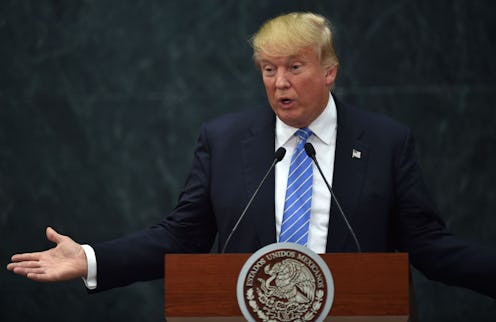News
Trump's Rise Is Correlated With The GOP's Fall
It's becoming increasingly clear that, in addition to chronically hurting his own electoral chances, Donald Trump is damaging the Republican brand as a whole, too. According to polls from YouGov, the share of voters who say they'd vote for a Republican for president has plummeted since Trump won the GOP nomination, and now, Democrats have the edge.
In some polls, voters are asked not which candidate they support for president, but which party. This is what's called a "generic ballot" question, and from around August 2015 to April of this year, Republicans were consistently beating Democrats. Around April, however, the tide began turning, and since then, larger portion of voters have said they'd prefer a Democrat president over a Republican one.
It wasn't until early May that Trump's last remaining opponent for the Republican nomination, Ohio Gov. John Kasich, dropped out of the race and effectively ensured that Trump would be the nominee. But around mid-April, it started becoming increasingly clear that Trump, barring any significant developments, was the favorite to become the Republican nominee. And that's when voters started saying they'd prefer a Democrat in the White House: Now, Democrats outpace Republicans by about 4 points on the generic ballot question.
To be sure, it's entirely possible that voters, as opposed to turning on Republicans over the last several months, have simply warmed to Democrats. But the graph itself is striking, and while correlation doesn't equal causation, it's striking nonetheless.
This isn't the only sign that Trump is hurting the party that nominated him. When he took a nosedive in the polls after the Republican National Convention, it's possible that he took several Republican Senate candidates with him. Two swing state Republican Senators running for reelection — Pat Toomey in Pennsylvania and Kelly Ayotte in New Hampshire — went from leading their Democratic opponents before the conventions to trailing them afterwards. Given that Democrats only need to win four* seats to take control of the Senate, this is a big deal.
If Trump's own difficulties have indeed hurt other Republicans candidates, it's probably due in large part to the decline of split ticket voting in America. Decades ago, it was common for Americans to vote for a Republican Senate candidate and a Democratic presidential candidate on the same ballot, or vice versa. But this has become rarer and rarer in recent years — and since presidential elections are more high-profile than down ballot elections, Senate and House candidates increasingly find that their fates are tied to the that of the party's presidential nominee.
This is bad news for every Republican candidate on the ballot in November, given that Trump has hideous favorability ratings and has been losing to Hillary Clinton in the polls for the vast majority of this cycle. If Trump doesn't start running a more competent campaign, he won't be the only loser on election night.
*If Trump wins the presidency, Democrats will need five seats to control the Senate. If Hillary Clinton wins, they'll only need to win four, as Tim Kaine will become the tie-breaking vote pursuant to his duties as Vice President.
